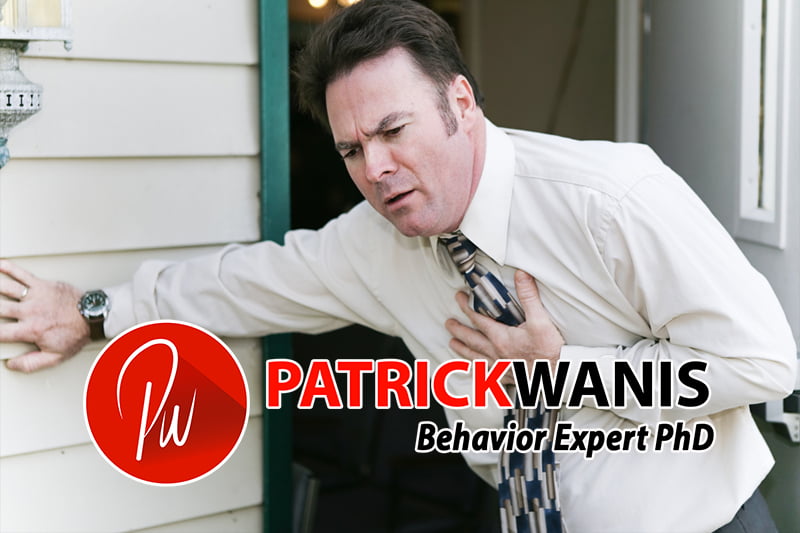
The following is a transcript of an interview between Patrick Wanis, Human Behavior and Relationship Expert, PhD and Dr. Michael Bauerschmidt, Medical Director of Full Potential Health Care https://www.fullpotentialhealthcare.com/ revealing how anger seriously impacts your body, aging you and causing death via strokes, coronary artery disease and heart attacks. Patrick Wanis and Dr. Mike also reveal quick and effective ways to deal with anger. For previous part of this transcript (Part 3), click here: https://patrickwanis.com/blog/solutions-help-dealing-with-anger/
Patrick: Anger, of course, is one part of the spectrum of stress and negative emotions. And studies reveal that chronic stress compounded with adversity, such as death, illness, divorce, or job loss result in the shrinking of the prefrontal cortex part of the brain. And the prefrontal cortex region is critical for the regulation of emotions, desires, impulses and physiology.
Anger is catabolic and destroys your body. Learn the secrets to happiness now. Click on the image and learn “How to find happiness”
In other words, when that part of the brain shrinks, we lose control over our emotions. So therefore, we can logically say that when a person becomes extremely angry, if that’s compounded with extreme stress, he or she could end up saying things that they don’t really mean because they have no control over their emotions and over their emotional impulses.
There’s two states that our body goes through: catabolic and anabolic. Anabolic is where the body’s growing and catabolic is where the body is breaking down.
Dr. Mike: Correct.
Patrick: So I would assume that it’s safe to say that anger has a catabolic effect on the body, it breaks down the body.
Dr. Mike: That’s precisely what I was talking about earlier, but I didn’t want to use catabolic and anabolic until we had the definition for it. But absolutely, anger, bottom line, it’s a catabolic state, that’s how it increases the oxidative stress.
Patrick: The reason that I bring those two up is that in the world of fitness and people who work out in the gym and, particularly, people who are working with weights and, therefore, men who focus on building muscle need to be aware of the catabolic effect of anger — that anger actually breaks down your body. So, even if you’re working out in the gym, but you suffer from chronic anger, you’re actually not helping your body to build muscle, your body’s going to actually be in a breakdown state.
Dr. Mike: It’s very similar to what we talked about earlier with respect to, you know, running the anger off, you know, running the hormones out. You really are not doing that. You’re just perpetuating them because you’re diverting the blood flow from your body’s ability to get rid of the excess hormones and you’re diverting it to — you’re diverting the blood flow to muscle and muscle tissue development and you’re maintaining that higher — those higher levels of those stress hormones for longer periods of time.
Patrick: Anger, of course, is often connected to a variety of other emotions because I teach that anger is the initial response to feeling injured, to feeling wronged, to believing that an injustice occurred or that you didn’t get what you want. Underneath the anger is often other emotions that can be resentment, frustration, anxiety, disappointment, loss, bitterness, revenge. What effect do they generally have on the body? Or do we group them together?
Dr. Mike: In essence, all you’re doing is perpetuating the anger. I heard a wonderful definition one time. “Resentment is not getting what you wanted in the past, anger is not getting what you want in the present, and fear is the thought you’re not going to get what you want in the future.” [editor’s underlining.]
And if you’re walking through life in a chronically needy state, a chronically angry state, a chronically I have to have, I need, I want, you’re going to be shortening your life. And all the frustration, the anxiety, these all will also increase your stress hormone levels. The brain doesn’t just respond to car accidents or threats, it responds — your emotional state has a lot to do with how the brain is perceiving stress.
And if you’re walking around chronically angry or upset or frustrated or anxious, then you’re going to be increasing your stress hormones and your feel-good hormones — your dopamine, your oxytocin — are going to suffer as well. And so, you can end up, you know, if you will, chasing your own tail and creating more of the problems you’re, many times, afraid to get to begin with.
For Part 5 of this transcript – the continuation, click here: https://patrickwanis.com/blog/how-anger-causes-anxiety-fear-how-to-overcome-them/
Anointed “The Woman Expert” by WGN Chicago, Patrick Wanis PhD is a renowned Celebrity Life Coach, Human Behavior & Relationship Expert who developed SRTT therapy (Subconscious Rapid Transformation Technique) and is teaching it to other practitioners. Wanis’ clientele ranges from celebrities and CEOs to housewives and teenagers. CNN, BBC, FOX News, MSNBC & major news outlets worldwide consult Wanis for his expert insights and analysis on sexuality, human behavior and women’s issues. Wanis is the first person ever to do hypnotherapy on national TV – on the Montel Williams show.
